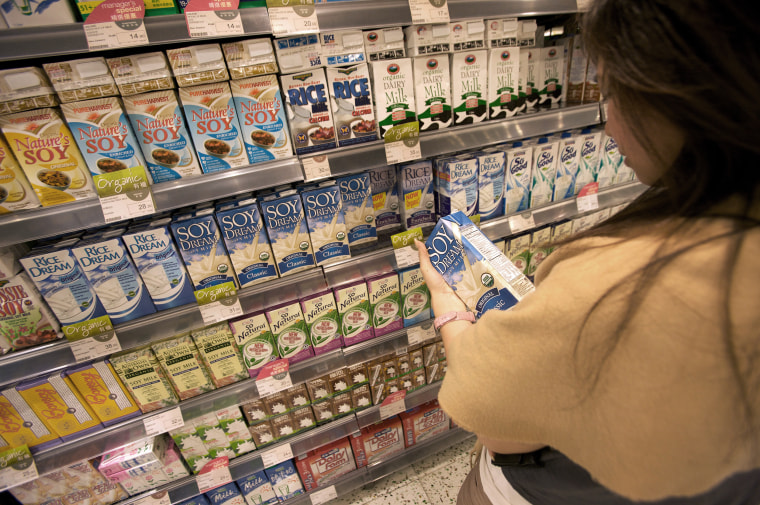Breast cancer patients who eat the most soy foods are also less likely to die early, a new study finds.
Researchers found women who ate the most soy foods were 21 percent less likely to die over 9 ½ years than women who ate the least.

And, contrary to some fears, soy had no bad effects on women with breast cancer fueled by the hormone estrogen, the study found.
It’s one more piece of evidence in support of eating soy, which has been shown to lower the risk of heart disease, too.
“Our results suggest, in specific circumstances, there may be a potential benefit to eating more soy foods as part of an overall healthy diet and lifestyle,” said Dr. Fang Fang Zhang, an expert in cancer and nutrition at the Friedman School of Nutrition Science and Policy at Tufts University, who led the study.
“We recommend that readers keep in mind that soy foods can potentially have an impact, but only as a component of an overall healthy diet."
Related: Bad Diet in Teen Years Could Raise Breast Cancer Risk
Researchers have long noted that women living in Asia who eat a lot of soy have far lower rates of breast cancer than women in the West. And some studies have shown that women in other parts of the world who eat a lot of soy also have lower breast cancer rates.
“Especially for women with hormone-receptor-negative breast cancer, soy food products may potentially have a beneficial effect and increase survival.”
But some laboratory research also shows that compounds in soy called phytoestrogens might interfere with hormone-based cancer treatments, so some doctors have been wary of recommending soy to breast cancer patients.
Zhang’s team studied 6,235 women with breast cancer taking part in a bigger study. They filled out food diaries and have been watched since 1995. Over 9.4 years, 1,224 of them died of various causes.
Those in the top 25 percent of soy consumption were 21 percent less likely to die of any cause than those who ate the least soy, the team reported in the journal Cancer.
Related: Half of U.S. Cancer Deaths Due to Bad Habits
The researchers say their study is more diverse than previous studies because 17 percent of the volunteers were Hispanic, 12 percent were black and 11 percent Asian American.
“Although Asian-American women enrolled in the (study) had a higher mean intake of dietary isoflavone than women from other racial/ethnic groups, these intake levels were substantially lower than those of women living in Asian countries,” the team noted.
“Based on our results, we do not see a detrimental effect of soy intake among women who were treated with endocrine therapy, which has been hypothesized to be a concern,” Zhang said.
“Especially for women with hormone-receptor-negative breast cancer, soy food products may potentially have a beneficial effect and increase survival.”
Related: Exercise Keeps Breast Cancer Patients Alive Longer
Dr. Omer Kucuk, a cancer and nutrition expert and researcher at Emory University in Atlanta, said doctors can safely recommend that women eat soy foods.
“We now have evidence that soy foods not only prevent breast cancer but also benefit women who have breast cancer. Therefore, we can recommend women to consume soy foods because of soy’s many health benefits,” Kucuk, who was involved in the research, wrote in a commentary.
“In general, soy foods are considered among the healthiest for human consumption.”
Related: Soy Poses no Risk to Breast Cancer Patients
It’s not entirely understood why soy foods have such strong effects. They’re made from soybeans, which are high in fiber. But they also are rich in compounds called isoflavones, which include daidzein and genistein.
Genistein can interfere with cell growth and proliferation and that in turn may slow tumors.
"Soy foods may have other health benefits such as prevention of hypertension, diabetes and cardiovascular disease in addition to their cancer preventive effects.”
“Although soy isoflavones have attracted much attention regarding their effects as cancer-preventive compounds, soy foods contain other bioactive compounds such as saponins, lunasin, Bowman-Birk inhibitor, omega-3 fatty acids, sphingolipids and dietary fiber,” Kucuk wrote.
“Thus, soy foods may have other health benefits such as prevention of hypertension, diabetes and cardiovascular disease in addition to their cancer preventive effects.”
Kucuk noted that studies have shown that eating soy before and during puberty may have some of the strongest benefits.
Americans do not eat as much soy as people in China and Japan, but they may eat more than they realize. Soy protein is found in many processed foods and is widely used in cereal, infant formula, granola bars, ice cream and cheese products.
Breast cancer is the No. 2 cancer killer of U.S. women, after lung cancer. Every year, it's diagnosed in 200,000 women and a few men, and kills around 40,000.
